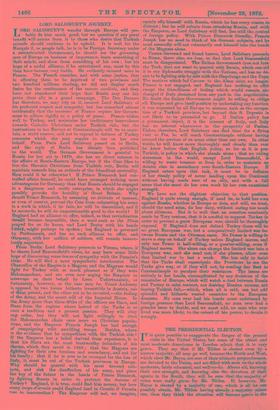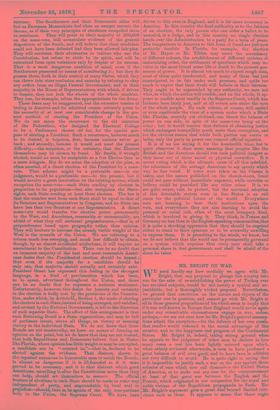THE PRESIDENTIAL ELECTION.
I T is quite possible to exaggerate the danger of the present crisis in the United States, but some of the ablest and most moderate Americans in London admit that it is very grave. They say that if Mr. Tilden is elected even by a narrow majority, all may go well, because the North and West, which elect Mr. Hayes, are sure of their ultimate preponderance, are devoted to the Union, and are filled with men on the whole moderate, fairly educated, and well-to-do. Above all, knowing their own strength, and knowing also the devotion of their agents in the South, they will be sure that the majority of votes were really given for Mr. Tilden. If, however, Mr. Hayes is elected by a majority of one, which is all he can possibly obtain, Mr. Tilden having- already a majority minus one, then they think the situation will beeome grave in the extreme. The Southerners and their Democratic allies will feel as European Monarchists feel when an usurper mounts the throne, as if their very principles of obedience compelled them to resistance. They will point to their majority of 300,000 on the mass-vote, will accumulate evidence of the general disposition of the South, and will believe that their candidate could not have been defeated had they been allowed fahaplay. They will condemn their adversaries as traitors who use the Conetitution, but refuse to abide by its spirit, and will be restrained from open resistance only by despair of its success. That is a most dangerous condition of mind, even if the Southerners possessed no means of manifesting it; but they do possess them, both in their control of many States, which they can throw into utter confusion and anarchy by refusing to obey any orders from an illegal Central Government, and in their majority in the House of Representatives, with which, if driven to despair, they can lock the wheels of the whole machine. They can, for example, refuse the appropriations for the Army.
These fears may be exaggerated, but the excessive tension of feeling in America and its admitted causes certainly point to the necessity of at least one considerable change in the pre- -sent method of electing the President of the Union. We do not mean the recurrence to the old intention of the Federalists, who designed the Electoral College to be a Parliament chosen ad hoc, for the special pur- pose of electing a President. Such a recurrence, however mach to be desired, is hopeless, first, because nations never go back; • and secondly, because it would not meet the present difficiilty,—the suspicion, or the certainty, that the Electors themselves may be chosen by fraud. Mr. Smith, if wrongly elected, would no more be acceptable as a free Elector than as a mere delegate. Nor do we mean the adoption of the plan, so often mooted, of a direct election of the President by a mass- vote. That scheme might be a preferable one—in our judgment, would be a preferable one—to the present, but it would involve a great innovation on the existing system, which recognises the mass-vote—each State sending up electors in proportion to its population—but also recognises the State- rights, each State sending at least three electors. The law is that the number sent from each State shall be equal to that of its Senators and Representatives in Congress, and no State can have less than two Senators or one Representative. A direct mass-vote would transfer the elective power permanently to the West, and Americans, reasonably or unreasonably, are afraid of what they call sectional preponderance —that is, of preponderance based upon geography rather than opinion. They will hesitate to increase the already visible weight of the West in the councils of the Union. We are referring to a reform much less sweeping, and much less difficult to obtain, though, by an almost accidental misfortune, it will require an amendment to the Constitution. There can be no doubt that an immense majority of the best and most reasonable Ameri- cans desire that the Presidential election should be honest ; that even if the majority for a candidate should be only one, that majority should actually and certainly exist. President Grant has expressed this feeling in the strongest language, in a kind of proclamation -which has been, so to speak, advertised throughout the Union, and there can be no doubt that he, expresses a national sentiment. Unfortunately, however, this desire for honesty and certainty in the election is badly met by the provisions of the Constitu- tion, under which, by Article IL, Section 1, the mode of electing the electors in each Staley instead of being arranged, and watched, and revised by the National Government, is left to the discretion of each separate State. The effect of this arrangement is that each Returning Board is a State organisation, and may be full of partisans intent, above all things, on victory or seeming victory in the individual State. We do not know that these Boards are not trustworthy, we have no means of fanning an opinion on the point, but we do know that they are not trusted, that both Republicans and Democrats believe that in States like Florida, where opinion has little weight or may be corrupted, a candidate can be "counted in,"—that is, declared to be elected against the evidence. That distrust, shown in the repeated summons to honourable men to watch the Boards, is almost as dangerous if it is ilt-founded as if it were proved to be necessaay, and it is that distrust which good Americans, unwilling to alter the Constitution more than they can help, should set themselves to remove. The official trustees of elections in each State should be made in some way independent of party, and unpunishable by local zeal or prejudice--should, that is, be agents of the only non-partisan body in the Union, the Supreme Court. We have been driven to this even in England, and it is far more necessary in America. In this country the final authority as to the fairness of an election, the only person who can order a ballot to be unsealed, is a Judge, and in this oountry no single election hands over the Administration to a party for a term of years. The temptations in America to this form of fraud-are just now perfectly terrible. In Florida, for example, the election of Mr. Hayes or Mr. Tilden may mean the ascendancy of different colours, the establishment of different systeins of maintaining order, the settlement of questions which may in- volve in the most literal sense life or death to the present poe- sessors of power. It is almost too much to expect -rough men, most of them quite uneducated, and many of them but just emancipated, to be fair under such pressure, and quite -too much to expect that their rivals will believe in their fairness. They ought to be supereeded by any authority, we care not what, in which the nation will confide, and on the whole, it ap- pears to confide most readily in the Supreme Court, which has hitherto been fairly just, and at all events acts ender the eyes of the whole people. No such reform, of course, will amend or even ameliorate the vices of a system under which a State like Florida, scarcely yet civilised, can throw the balance of power on one side, in spite of the mass-vote being on the other; but it would remove that distrust of obtaining justice which endangers tranquillity much more than corruption, and for the obvious reason that while both parties can coerce or bribe, only the party in power can commit official injustice. It is of no use saying it for the hundredth- time, but to quiet observers it does seem amazing that peoples like the British and the American should run such political dangers as they incur out of sheer moral or physical cowardice. It is secret voting which is the ultimate cause of all this mischief, the reluctance of the average American to say openly which way he has voted. If votes were taken as the Census is taken, and the names published on the church-doors, fraud could not pass without immediate exposure, while coercion or bribery could be punished like any other crime. It is, we are quite aware, vain to protest, but the universal adoption of this detestable system even in free States is an evil omen for the political future of the world. Everywhere men are learning to base their institutions upon the vote, and everywhere they are also learning to avoid, the personal or social risk, often of the most trumpery kind, which is involved in giving it. They think, in France and Germany no less than in the English-speaking commimities,that it is quite a shocking oppression that they should be required either to stand to their opinions or to be avowedly unwilling to express them. It is preaching to the winds, we know, but we do not believe that the world can be permanently governed on a system which requires that every man shall take a personal share in that government, and shall be afraid of the share he takes.







































 Previous page
Previous page